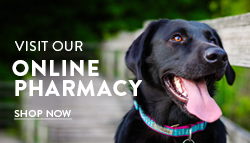Blog

One of the top challenges a dog has throughout its life is dental disease. Learning how to prevent dental disease in your dog can help save him from years of painful problems. Four out of five dogs over the age of three have some form of dental disease already well on its way to becoming a problem – if it’s not already. This is largely due to improper diet, lack of exercise, the absence of an oral care routine, and the avoidance of the doggy dentist. Let’s take a look at what you can do to avoid painful and costly dental disease in your dog.
The Wellness Visit - A Fun Yearly Adventure
Great oral health in pets is the product of a concerted effort to make sure the right practices are in place throughout the lifespan of your pet. Ideally, this effort begins when your pup is still young and continues as they age. The first step in a long-term oral care plan is establishing a regularly scheduled wellness visit with your vet. This is the number one tool in your long-term care belt that can ensure not only is your pet in great oral health, but also overall systemic health.
During your wellness visit, you will be provided with all the information you need to ensure your pet is on the right track – in addition to a full physical exam. This is especially true with respect to proper diet – the first element of a health-promoting oral care routine. When a great diet is in place, your pup can develop a strong immune system and a healthy oral biome right from the start. This makes the next step in the process – your at-home oral care routine – much easier and more effective.
Home Not-So-Sweet Home
Now that you have established a relationship with your vet and they have taken care of their part of the deal, it’s your turn to take the wheel of responsibility. This responsibility includes avoiding things that cause dental problems (like sugary sweet treats and low-quality pet food) and introducing the things that support great health.
The good news is, you have the easy job. All you have to do is make sure you keep feeding your pet wholesome, nutritious food, give them adequate exercise (at least 20-minutes of up-tempo panting per day), provide lots of positive attention, and most importantly, brush their teeth daily.
Yes, you read that correctly. You have a responsibility to brush your dog’s teeth every day. When you can wholeheartedly take on the task of daily oral care for your pet, you are giving them the best chance of a pain-free (and low cost for you) dental experience well into their senior years – if not their whole life.
A tooth brushing routine is quick and easy to establish and maintain. Ease your pup into the experience. Make sure to get the right toothbrush and pet toothpaste for the size and temperament of your dog. Take your time and give them a chance to enjoy the experience of special time together with you. Your efforts will pay off over time – you’ll have a happy, pain-free pet and you’ll be avoiding large vet bills due to health problems. This is a win-win for everyone!
Treats and Chews
Another great way to keep your pet’s mouth in good shape (as part of a well-rounded care plan) is to provide them with a chew toy that is designed to help clean their teeth. This can also be done with specially formulated dental chews, although raw bone or antler would be better. As long as you get something that is the right size for your pup’s bite strength and mouth size you’ll be in great shape. Regardless of the path you choose, make sure always to provide treats that are not full of fillers, coloring, byproducts, preservatives, and other health dampening ingredients.
Final Thoughts
Learning how to prevent dental disease in your dog will be one of the best things you can do. It will save your pup from experiencing many years of silent pain – and you from costly treatments. The good news is that you have a fairly easy task at hand. Make sure to establish a daily oral care routine that includes a few minutes of tooth brushing, some brisk exercise, and some good ‘ol ear scratches. If you’re due for your yearly wellness visit, reach out to a team member here at Bergen County Vet and give us a call at (201) 205-2500. We look forward to hearing from you!






